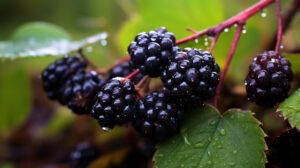Blackberry Picking

When I was a child on our farm, I often went blackberry picking with my mother. She patiently taught me which berries to pick and which to leave to ripen. She gave me an empty pail that once held the government surplus syrup we got because of my grandmother’s blindness. She lived with us, and she qualified for food assistance. Now, whenever I carry a paint can by its wire bail, I think of those days of picking blackberries, and I think, too, of what it felt like to stand in line along the tracks in town, waiting with a bushel basket for the commodities train to roll to a stop and for the men on a boxcar to fill our basket with pails of syrup and boxes of powdered milk and whatever else was allotted us that month. Our standing in line announced us as a family in need.
I did my best to forget the commodity train and the line we stood in and the way some folks, their cars bumping over the railroad crossing, would turn their heads to take in the sight of us. Some people brought cardboard boxes; others, like us, had baskets. Old women leaned on canes. Old men smoked hand-rolled cigarettes. Horseflies tried to pester us. We had no place to escape to. We kept standing in the line—we had to—waiting for the train.
The blackberry briars grew at the edges of our woodlands. My mother, and sometimes my other grandmother—the younger, healthier one—dressed in men’s overalls and long-sleeved flannel shirts to keep the chiggers from their skin. It wasn’t a foolproof method. We all left our berry picking with a few bites that itched like crazy. My mother and grandmother filled five-gallon buckets, while I worked with my syrup pail. I may have eaten more berries than I picked. I looked forward to the cobblers my mother would make.
Those nights, when I closed my eyes to sleep, I kept seeing the berries, their clusters of purple-black drupelets shining. It was as if I could reach out and just about touch them. The blackberries persisted even in my dreams. All night, I imagined the berries. I was, like the speaker in Robert Frost’s poem, “After Apple-Picking,” “. . . overtired/ Of the great harvest I myself desired.”
A blackberry is not just a blackberry to me. It’s emblematic of both abundance and want. Each summer the briars were heavy with fruit. Meanwhile, my grandmother spent much of her time resting, feeling “puny,” as she often said, but I can recall the sound of her fingers scratching our plaster walls as she slowly felt her way from her room to the kitchen where she made herself a cup of tea. She knew how to fill the kettle with well-water pumped at the sink and how to set it on a gas burner. She knew where the kitchen matches were and how to strike one against the stovepipe and light the burner. She knew how to fill her cup and how to dunk her Lipton teabag. I kept waiting for her to make a mistake, but she never did. What must she have been seeing—she who had lost her sight as an adult? What memory did she have of this house that had once been hers, a house she navigated with ease?
I was too young, then, to know how time passes in a blink and too young to know the images I’d never forget: the blackberries, the train, the people in line, my grandmother’s fingers trembling as she made her tea. I only knew I wanted to taste the sweetness of the fruit, those berries that tempted me even in my sleep.
The post Blackberry Picking appeared first on Lee Martin.



